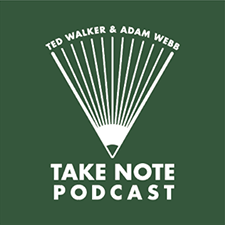Ezra Klein and Annie Murphy Paul on Notebooks and Screens

Adam shares an excerpt from The Ezra Klein Show that is relevant to our interests. This is a long quote but the much longer episode, titled “This Conversation Will Change How You Think about Thinking,” is well worth a listen.
Ezra Klein
Why is the particular material or medium that we offload to so important? You just mentioned looking at a small screen. I was thinking as you said it that — so my version of offloading is my workstation is I have a computer and then I keep next to it two notebooks at all times. And one notebook is for any to do item that ever pops into my head.
Email this person. Call the doctor. Write a column. Whatever it might be. Just anything that is, it has to happen later, and then another just for notes and ideas. But I found over time I couldn’t do that on the computer. I have all kinds of to- do apps and note taking apps, but I had to move over to paper, which has a different feeling when I’m on it. So you talked about screens. Why do we think differently when looking at different things?
Annie Murphy Paul
That’s really interesting. Well, the size of the screen matters. As I mentioned, there’s a lot of benefits to be gotten from having multiple or very large screens. And that’s because it consumes cognitive bandwidth to have to scroll and make things bigger or smaller or find where we filed something. All of that gets offloaded when it’s spread out in front of us and we can remember with our spatial memory, oh, that piece of information is over here on my right, rather than having to navigate with our electronic tools. And so it’s not necessarily that screens are the problem, because big screens can and do enhance our thinking.
On the other hand, I write a lot in the book about how artists and designers and people who swear by the pencil and the conversation that happens between pencil and hand and eye and paper that, again, it’s kind of a misunderstanding to think that the brain conceptualizes an idea or an image and then tells the hand how to execute it and then it’s done. That’s a very computer-like idea of how work happens. Instead, artists and designers find that it’s much more of an iterative process where they draw something. They make a mark, and then the mark reminds them of something. And they add another mark. And it’s a conversation, again, between hand and eye and paper and pencil. And I think the materials we use to do our thinking with, our external outside the brain thinking, can make a big difference in terms of what kinds of thoughts we’re able to have.
Ezra Klein
You don’t talk too much about why this might work worse on screens, but let me try something out on you, which is that screens also have a pretty intense conversation. So when I move to write something on my to do notebook, it just goes on the notebook and that’s all that really happens. If I go open up my app, it’s like my dock expands and I see notifications and all kinds of things begin to happen.
And so it’s a conversation not just between your eye and your pencil and your paper, but everything that your computer is doing. When I’m looking right now at the screen on which we’re recording, I’ve got all — I can see some tabs. I can see extensions. And if I’m thoughtful about it, I remember to get rid of that stuff before I try to get into a focused place. But every time I change a screen, a lot more comes up.
So is part of it simply that when you’re offloading, part of the danger is you don’t want to onboard new things? You’re actually trying to get things off. And computers, phones, et cetera, so many of the things are built to onboard new things in order to capture our attention for a little bit longer.
Annie Murphy Paul
Yeah, no doubt. I mean, that makes me think of how ecological psychologists talk about how different tools have different affordances. We can do different things with them. We’re led to do different things with them. And part of the beauty of an old fashioned print book or a notebook that is just — or a sketchpad that just has a bunch of blank pages — is there’s not all those built in distractions that are just waiting to leap out at you.
And the idea of the extended mind actually originated not in thinking about how we extend our minds with the body or with spaces or with other people. Those kind of came in later, because the idea of the extended mind is so generative and can operate as this kind of umbrella concept. Originally the idea of the extended mind was looking at tools like a notebook, like a smartphone, and how they assume some of our mental functions for us and thereby extend our minds.
But I am really interested in the ways that many of our tools, especially our digital tools, don’t end up extending our minds at all. They actually contract them. I could write another book called the contracted mind. But I think we have to, again, be really intentional and really skillful in the way that we use our devices to make sure that they are extending our minds in the way that they can and not actually diminishing our thinking.




